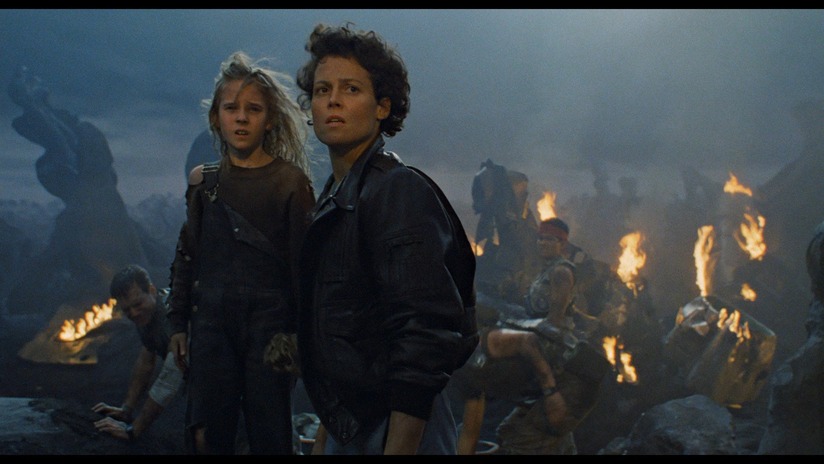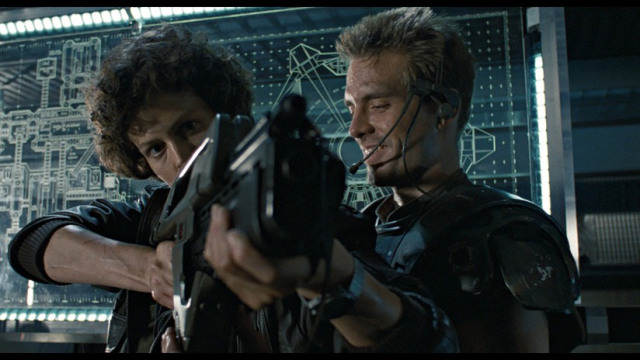Almost 30 years ago, a nearly unknown filmmaker named James Cameron created a science fiction masterpiece that changed the genre forever and became a landmark film with long reaching influence. As a pure action movie, Aliens is as well constructed and paced as any in Hollywood history. Let’s take looks back at James Cameron’s Aliens, one of the greatest films of our generation.
 Aliens is set 57 years after the events of the first film. It begins with Ripley being rescued & revived from hypersleep after drifting in space far longer than she ever expected. After hearing her account of what happened to her former crew on Nostromo, the panel board turns down her story, revokes her space-flight license & makes her aware of the colonisation of the planet LV-426, where the alien spaceship was found in the first film. Things set in motion when the contact with the colony on planet LV-426 is lost and Ripley is requested to join a group of space marines to investigate which she, after initially refusing, finally accepts in order to face & overcome her fears.
Aliens is set 57 years after the events of the first film. It begins with Ripley being rescued & revived from hypersleep after drifting in space far longer than she ever expected. After hearing her account of what happened to her former crew on Nostromo, the panel board turns down her story, revokes her space-flight license & makes her aware of the colonisation of the planet LV-426, where the alien spaceship was found in the first film. Things set in motion when the contact with the colony on planet LV-426 is lost and Ripley is requested to join a group of space marines to investigate which she, after initially refusing, finally accepts in order to face & overcome her fears.
Given the task of following up Ridley Scott’s Alien, a lesser director would have simply provided more of the same. Another ship, and another crew to impregnate, stalk and terrorise by an apparently indestructible alien creature. It’s to James Cameron’s credit that, when he wrote and directed the sequel to Ridley Scott’s original, he chose to strike out on a different path, creating a film with its own tone, pace and themes while still adhering to various visual and narrative laws set up in the first film.
 In Alien, we got to know the monster; how it grows to maturity inside an unwilling host, how it bleeds acid, and how difficult it is to kill once it’s loose. In that film, we watched a single one of these life forms tear an entire ship out from under its crew, and no matter what steps were taken to defeat it, the alien simply would not die. In Aliens, James Cameron shows us what an army of them is capable of, and by doing so transforms his movie into more than a mere sequel.
In Alien, we got to know the monster; how it grows to maturity inside an unwilling host, how it bleeds acid, and how difficult it is to kill once it’s loose. In that film, we watched a single one of these life forms tear an entire ship out from under its crew, and no matter what steps were taken to defeat it, the alien simply would not die. In Aliens, James Cameron shows us what an army of them is capable of, and by doing so transforms his movie into more than a mere sequel.
Where Alien was a comparatively slow horror thriller that prowled like a lion in undergrowth, Aliens was a war film that sped from one set piece to the next, slowly building up to a roller coaster of bombastic action. That Aliens is bigger and louder has led some to suggest that Cameron’s sequel is superior to Scott’s original, while others prefer the latter’s reliance on atmosphere and quiet suspense. But I’d suggest that, rather than either being superior, the two films complement one another in a way seldom seen in cinema.
 Alien was metaphor for sex and encountering something traumatic that could barely be comprehended, a monster that violated as well as killed, that rendered its victims chillingly powerless. Aliens is about facing trauma head on, and gaining closure in the process. In Aliens, Cameron quickly establishes that the events of the first film had caused Ripley to lose everything. By returning to LV-426, the now terraformed planet of Alien, Ripley is able to confront the trauma of her past, and in the final battle with the alien queen, ultimately overcome it.
Alien was metaphor for sex and encountering something traumatic that could barely be comprehended, a monster that violated as well as killed, that rendered its victims chillingly powerless. Aliens is about facing trauma head on, and gaining closure in the process. In Aliens, Cameron quickly establishes that the events of the first film had caused Ripley to lose everything. By returning to LV-426, the now terraformed planet of Alien, Ripley is able to confront the trauma of her past, and in the final battle with the alien queen, ultimately overcome it.
It’s also worth noting that, where Alien was cut off from any sense of society, Aliens gives a greater sense of social order. We even see the ant-like hierarchy of the aliens themselves, with soldier aliens protecting the egg-laying queen. We even learn that the aliens can, in a basic way, be bargained with, as Ripley threatens the queen’s eggs with a flamethrower. With a quiet nod from the queen, the soldier aliens back away.
As a pure action movie, Aliens is one of the best constructed and paced in Hollywood history. Its first hour methodically reintroduces Ripley and the outfit of cocky Colonial Marines who will accompany her to LV-426. Once the action starts however, the film peels back the layers to reveal a display of pure action and suspense. Then there’s Cameron’s endlessly quotable script and broad, memorable characters. Wisecracking space marines have since become a cliché of cinema and video games. Cameron’s, headed up by Hicks, Hudson and Vasquez, are the original and still the best. And let’s not forget about that creepy android (or Artificial Person) Bishop, or the slick company representative Carter Burke. We can trust them… or can we?’
As for this film’s technical achievements, Aliens’ art direction & set designs may not have surpassed the artistic levels set in the previous film but it certainly comes close. However, the one category where this film sets a new benchmark of its time is in its state-of-the-art visual & sound effects. Visual effects are absolutely groundbreaking and that’s one part which has since become a trademark in James Cameron’s films. Sound always plays a big role in combat & horror films and is impressive here as well, be it the sound of guns blazing, aliens shrieking or explosions. Cinematography successfully creates a more evolved atmosphere of what existed in the original film. Editing is cleverly done & it successfully manages to keep the viewers gripped to their seats for 2.5 hours which goes pretty unnoticed. And finally, the score perfectly balances the tone of the film and stays in sync with the film’s content. It’s loud, terrifying, suspenseful & also touching wherever & whenever it’s supposed to be. Splendid work by composer James Horner.
Cameron’s biggest achievement in Aliens was in creating a film that dovetails so perfectly with the original Alien. Watched back to back, Alien becomes the first act to Cameron’s lengthier story. Ripley encounters the xenomorph and all the horror that comes with it in the first film, and through a mixture of circumstance and bravery, is able to put those horrors to rest in the second. This gratifying sense of closure is one reason why the attempt to create a second sequel was always doomed to failure. With Aliens, Cameron had already created an arc for Ripley’s character that was both satisfying and logical, and demonstrated that the aliens themselves, apparently indestructible in Scott’s movie, could be killed after all.
Like Cameron’s later work, Terminator 2, what makes Aliens more than just a sci-fi action thriller is the underlying emotional connection between the characters, particularly between Ripley and Newt. There are also semi-romantic undertones between Ripley and Hicks, but they are wisely kept as undertones. A full-blown romantic subplot would have interrupted the movie’s lightning fast pace. By the climax, we’re not only on the edge of our seats because of the action and tension, but because Ripley, Newt, and Hicks have come to mean something to us. When Newt is taken by the aliens to their nest, necessitating Ripley’s climactic confrontation with the Queen, it ups the stakes even further in a climax that already approaches the harrowing urgency of Alien. And the climactic battle between Ripley and the Queen is not only human vs. alien, but two mothers pitted against each other in defense of their “children.”
Even though many fans will be divided over which is a better film between Ridley Scott’s Alien & James Cameron’s Aliens, there is no denying that both films are masterpieces & immortal for their contribution to horror, action & science-fiction genres. And looking back, Aliens is indeed a perfect follow-up to Alien, not just because it explores the elements of the original beautifully, but also because it places greater emphasis on staying true to the original by following it up with an equally mesmerizing story rather than something made just for financial gains, like most sequels of today. Highly entertaining, immensely satisfying & a spectacular roller-coaster ride of non-stop action, Aliens refuses to age even after three decades and continues to rank amongst the most intense & fulfilling pieces of action films, ever. Although Aliens is strong enough to be a standalone film, it still would be a wiser move to visit the original by Ridley Scott before moving on to this one. Despite their differences, Aliens feels very much of a piece with Alien, and in retrospect, this is where the series should have ended. Unfortunately, opportunities to continue milking a franchise for box office profits often supersede creative integrity, but the shortcomings of the following installments do not diminish what Ridley Scott and James Cameron achieved with Alien and Aliens.